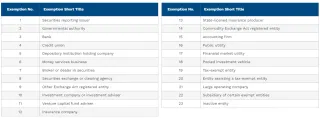
Done-For-You Beneficial Ownership Information Report (BOIR)
As part of the Corporate Transparency Act, a new federal mandate requires that
businesses file a Beneficial Ownership Information Report.
This includes most LLCs and Corporations, including single member LLCs.
To avoid criminal and civil penalties, download our free guide today.
We Will File Your Report In 3 Easy Steps

The Beneficial Owners
Answer a few simple questions about the individuals who own or control your business so your report is personalized and accurate.

Your Official Report
We’ll prepare a personalized report that satisfies the beneficial ownership information reporting requirement, and we’ll file it for you.

Assurance
Once we file your personalized report with the Financial Crimes Enforcement Network (FinCEN), we’ll provide confirmation.
What Is The Beneficial Ownership Information Reporting Rule?
The Beneficial Ownership Information Reporting Rule under the Corporate Transparency Act is a new filing requirement of the Financial Crimes Enforcement Network (FinCEN), a bureau of the United States Department of the Treasury.
The rule creates transparency around company ownership structures and helps the federal government prevent financial crimes and fraud, such as money laundering, corruption, human trafficking, drug trafficking, tax fraud, and fraud against employees, customers, and other businesses.
Beneficial ownership information reporting supports the ongoing focus and efforts of the U.S. government to deter corporations who would hide or benefit from actions that harm others.
Who Is A Beneficial Owner?
A beneficial owner under the Corporate Transparency Act is an individual who directly or indirectly: (1) owns or controls at least 25% of your company’s ownership interests, or (2) exercises substantial control over your business. Common examples of someone that exercises substantial control can include the following:
An important decision-maker for the reporting company
A senior officer (president, chief executive officer, chief financial officer, general counsel, chief operating officer, or any other officer with a similar function)
An individual with the authority to appoint or remove certain officers or a majority of directors (or similar body) of the company
Not Sure If You Need To File A BOIR?
Do a quick requirement check.
Why Use Tax Work Team To File A Beneficial Ownership Information Report?

Stay Compliant
Fulfill the Corporate Transparency Act obligation with our expert assistance. We'll handle the submission of ownership and control information to FinCEN (Financial Crrimes Enforcement Network) on your behalf.

Save Time
Streamline your compliance with the Corporate Transparency Act using our quick and easy service. Trust us to ensure your report filing adheres to all necessary requirements.

Assurance
Count on us to include all the necessary information mandated by FinCEN on the latest regulations. Enjoy peace of mind with a confirmation upon the report completion with FinCEN.
Choose Our 100% Done-For-You Service
BOIR One-Time Filing
Get your BOIR filed by us. We’ll send your info to
FinCEN so you comply with the new rule under the
Corporate Transparency Act.
$199
This Includes:
Customized federally required report done for you
Simplified process and accurate filing
Confirmation of submission to FinCEN

What Are The Penalties For Not Filing?
Each business is responsible for filing a Beneficial Ownership Information Report which includes all of the individuals who control or own the business. However, a beneficial owner of a business who willfully fails to follow the reporting requirement and filing rules, or who misleads the Financial Crimes Enforcement Network, will face personal liability in the form of both criminal and civil penalties for noncompliance with the Corporate Transparency Act.
Failure to comply can lead to criminal penalties of imprisonment for up to two years and/or a fine of up to $10,000, and a civil penalty of up to $500 per day.
Even if a reporting company files the report on time, penalties can be imposed if the report does not include the correct information. It is critical that the reporting company’s filing is accurate. We can help you ensure accurate filing with a simplified reporting and filing process, satisfying the relevant law.
When Is The Beneficial Ownership Information Report Deadline?
The Beneficial Ownership Information Reporting Rule went into effect Jan. 1, 2024, so it’s important to get informed now about how to satisfy the requirements. The deadline varies depending on your date of formation, which we can help you determine, and we can help you stay on top of the process with notifications leading up to your filing deadline.
Generally, business entities formed before Jan. 1, 2024 will have until Dec. 31, 2024 to file. Business entities formed on or after Jan. 1, 2024 will have 90 days after formation to file. Business entities that amend their formation documents on or after Jan. 1, 2024 will have 30 days to submit a new report.
Taking care of this requirement will help you avoid criminal and civil penalties for failing to comply, including imprisonment for up to two years, a fine of up to $10,000, and/or a fine of up to $500 per day.
How Do I Get A Beneficial Ownership Information Report?
With our Beneficial Ownership Information Report service, you’ll be notified when it’s time to file your report. We’ll request the information needed to file, and we’ll create an accurate report that includes the identifying information about the individuals who own or control your business, satisfying the beneficial ownership information reporting requirement.
Then, we’ll file for you in a timely manner with the Financial Crimes Enforcement Network (FinCEN) and confirm successful completion for your peace of mind that you’ve satisfied the compliance requirement.
What Is In The Beneficial Ownership Information Report?
The Beneficial Ownership Information Report includes several pieces of information about the reporting company, such as its full legal name, any trade or DBA names, its address, federal tax ID number (or EIN), and the jurisdiction where it was created.
The report also includes the owners’ full legal names, birth dates, current addresses, images of acceptable identification documents (such as a passports or driver’s licenses), along with the issuing jurisdiction and the document’s ID number. If the person who filed your entity formation documents (known as the applicant) is not one of the beneficial owners, the applicant must also provide the same information as the beneficial owners.
Using our service simplifies the process for reporting and filing the required information with the Financial Crimes Enforcement Network, saving you time and stress related to deadlines and accurate filing of your report.


How Are LLCs Impacted By The Beneficial Ownership Information Reporting Rule?
Owners of a limited liability company (LLC) need to file the new report with the federal agency and provide basic contact information about the company and its owners (known as members). This requirement applies to single-member and multi-member LLCs.
Who Is Exempt From Beneficial Ownership Information Reporting?
Most small business entities are not exempt from this requirement. Entities that are exempt from beneficial ownership information reporting include publicly traded companies, tax-exempt nonprofit organizations, certain large operating companies, and others that meet specific requirements. The Financial Crimes Enforcement Network lists 23 types of exempt entities that do not qualify as reporting companies and certain individuals that can’t be listed as a beneficial owner under the reporting requirement.
Frequently Asked Questions
What is beneficial ownership information reporting?
One Beneficial Ownership Information Report is required for each business entity that has formed with the Secretary of State. The report provides identifying information about the individuals who own or control a business with the Financial Crimes Enforcement Network, satisfying legal requirements under the Corporate Transparency Act.
How do I get a Beneficial Ownership Information Report?
With Tax work team, you’ll be notified when it’s time to file your report based on your business and your formation date. We’ll create an accurate report that includes the identifying information about the individuals who own or control your business. Then, we’ll timely file your report with the Financial Crimes Enforcement Network and confirm successful completion for easy compliance and peace of mind.
How do I determine if I'm a beneficial owner?
A beneficial owner is an individual who directly or indirectly: (1) owns or controls at least 25% of your company’s ownership interests, or (2) exercises substantial control over your business. If you're not sure, you can always talk to an attorney from our legal network.
What is an example of a beneficial owner with substantial control?
Examples of beneficial ownership and beneficial owners with substantial control include:
. An important decision-maker for the reporting company
. A senior officer (president, chief executive officer, chief financial officer, general counsel, chief operating officer, or any other officer with a similar function)
. An individual with the authority to appoint or remove officers or directors (or similar body) of the company
What is the Beneficial Ownership Information Reporting Rule?
The Beneficial Ownership Information Reporting Rule under the Corporate Transparency Act mandates the identification of individuals who benefit from a legal entity. The rule is in place to provide transparency, and it helps the federal government crack down on financial crimes and fraud, such as money laundering, corruption, human trafficking, drug trafficking, tax fraud, and fraud against employees, customers, and other businesses.
What is the point of beneficial ownership?
Effective Jan. 1, 2024, beneficial ownership information reporting is a legal requirement under the Corporate Transparency Act and supports the ongoing focus and efforts of the U.S. government to deter those who would otherwise hide or benefit from actions that harm others.
What companies qualify as tax-exempt and may be exempt from Beneficial Ownership Information Reporting?
Companies qualify as tax-exempt entities if they meet any of the following criteria:
. The IRS considers them exempt entities under section 501(c) of the Internal Revenue Code (this will include many entities with nonprofit organization status).
. They lost tax-exempt status under the code less than 180 days prior.
. They are political organizations as defined under section 527(a) of the code.
. They are trusts as defined under section 4947(a) of the code.
What types of companies do not qualify as reporting companies and may be exempt from Beneficial Ownership Information Reporting?
The Financial Crimes Enforcement Network lists 23 types of exempt business entities that do not qualify as reporting companies under the reporting requirement.

What companies qualify as tax-exempt and may be exempt from Beneficial Ownership Information Reporting?
The agency defines a large operating company as meeting all of the following criteria:
. It is otherwise subject to a federal regulatory regime.
. It has over 20 people with full-time employment status in the U.S.
. They are political organizations as defined under section 527(a) of the code.
. It has a physical operating presence in the U.S.
. It is owned by an entity already exempt under the Corporate Transparency Act.
. It is otherwise designated as exempt by the Secretary of the Treasury and the U.S. Attorney General.
What types of companies qualify as inactive entities and may be exempt from Beneficial Ownership Information Reporting?
A reporting company must be an active business, and inactive entities are not required to report. The Financial Crimes Enforcement Network defines an inactive entity as meeting all of the following criteria:
. It was created before Jan. 1, 2020.
. It is not engaged in active business.
. It is not owned by a foreign person, resident, domestic partnership, corporation, or other estate or trust.
. It has not sent or received over $1,000 while transacting business in the last year.
. It has no assets, including ownership of other companies, in the U.S. or elsewhere.
What types of individuals are exempt from being listed as a beneficial owner according to the Corporate Transparency Act?
The Corporate Transparency Act exempts certain people from the beneficial owner definition, including:
. Minors
. Individuals acting as nominees, intermediaries, custodians, or agents on behalf of someone else
. Employees who are not senior officers and whose only interest or control is derived solely from their employment status
. Individuals whose only interest in a reporting company is derived solely from the right of inheritance
. Contingent trust beneficiaries
. Creditors whose only interest is to recover business debts
Who must file a Beneficial Ownership Information Report?
Corporations and limited liability companies (LLC) will be required to report identifying information about the individuals who own or control a business with the Financial Crimes Enforcement Network to satisfy requirements under the Corporate Transparency Act. This new requirement applies to most business entities unless an exception applies.
What is the Corporate Transparency Act?
The Corporate Transparency Act is legislation that changes the reporting requirements for beneficial ownership information of business owners operating in the United States. It requires businesses to identify and document any person who holds a 25% or greater ownership interest or exercises substantial control over the company.
Under the Corporate Transparency Act, most reporting companies must file information on each beneficial owner with the U.S. Treasury's Financial Crimes Enforcement Network (FinCEN). FinCEN has developed a database that holds information about each beneficial owner documented by a reporting company.
What are the changes for LLCs in 2024?
Members, or owners, of a limited liability company (LLC) are likely designated beneficial owners under the beneficial owner definition of the rule and need to file the new report with the federal agency and provide basic contact information about the company and its owners.
This requirement applies to single-member and multi-member LLCs, all of whom could be considered beneficial owners, and therefore would need to be identified in the Beneficial Ownership Information Report and filing, along with their identifying information.
What if there are changes to my business after filing a Beneficial Ownership Information Report?
Changes to the owners or controlling members of a business, or their identifying information, require updated beneficial ownership information reporting. For example, an updated Beneficial Ownership Information Report is required when a controlling member is a minor and reaches an age of majority or if a company becomes tax exempt. Additionally, an updated Beneficial Ownership Information Report is also required if initially reported information is incorrect or if entities amend their formation documents. Businesses have 30 days from the date of the change or amendment to file an updated Beneficial Ownership Information Report.
Why should a business use a service to submit the Beneficial Ownership Information Report?
The Corporate Transparency Act is one of the most important legislations to impact small businesses owners. Its latest requirement—the Beneficial Ownership Information Reporting Rule—is effective Jan. 1, 2024 and mandates that most limited liability companies and corporations must file the beneficial owner report. Navigating the new law can be confusing and distracting for small business owners who are otherwise focused on running and growing their business. A service like the one provided by Tax work team makes it easier for customers to get ahead of the requirement as soon as possible, and comply with the law to avoid criminal and civil penalties, which include imprisonment for up to two years, a fine of up to $10,000, and/or a fine of up to $500 per day. With Tax work team, customers can avoid noncompliance with three easy steps, reducing their risk while saving time and money. Customers start by answering a few simple questions about the individuals who own or control their business so the report is personalized and accurate. Then, a custom report that satisfies the beneficial ownership information reporting requirement is created and filed. Once we file the personalized report with the Financial Crimes Enforcement Network, we’ll provide confirmation of completion.
Ready To Get A Beneficial Ownership
Information Report?
What Our Customers Are Saying
This was great! I didn’t know about this program and Tax Work Team made it easy for me.

—Tony S., LLC Customer
I didn’t have the time for this but you made it fast and simple. It only took us 15 minutes and we had the FinSEN confirmation in a day!

—Tina M., Corp Customer
Tax Work Team, thank you! I am a small business and not good with this type of paperwork. You always responded so fast.

—Rosa R., Single Member LLC Customer
